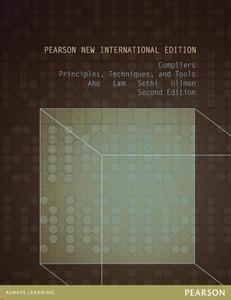Compilers Pearson New International Edition Principles, Techniques, and Tools, 2nd Edition
- Книги
- 12-02-2023, 00:36
- 138
- 0
- voska89

Compilers: Pearson New International Edition: Principles, Techniques, and Tools, 2nd Edition by Jeffrey D. Ullman, Alfred V. Aho, Monica S. Lam, Ravi Sethi
English | July 26th, 2013 | ISBN: 1292024348 | 947 pages | True PDF | 9.26 MB
Compilers: Principles, Techniques, and Tools, known to professors, students, and developers worldwide as the 'Dragon Book,' is available in a new edition. Every chapter has been completely revised to reflect developments in software engineering, programming languages, and computer architecture that have occurred since 1986, when the last edition published. The authors, recognizing that few readers will ever go on to construct a compiler, retain their focus on the broader set of problems faced in software design and software development.
New chapters include:
* Chapter 10: Instruction-Level Parallelism
* Chapter 11: Optimizing for Parallelism and Locality
* Chapter 12: Interprocedural Analysis
Features
* Introduces the theory and practice of compiler design.
* Covers topics like context-free grammars, fine state machines, and syntax-directed translation.
New to this Edition
* All new chapter on Interprocedural analysis, written by world-renowned computer scientist, Monica S.Lam.
* Presents the Five Methods for Translation to explain syntax-directed translation.
* Illustrates new techniques for data-flow analysis that emphasize the unity of code optimization and other program analysis software.
* Uses code optimization to work with parallel machines.
* Explains just-in-time compiling with programming languages such as Java.
* Discusses garbage collection.
* Brings all new material together through new case studies.
* Includes additional practice and tests comprehension of important concepts with Gradiance an online homework and tutorial system. Please note, Gradiance is no longer available with this book.
Links are Interchangeable - No Password - Single Extraction



